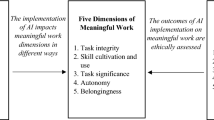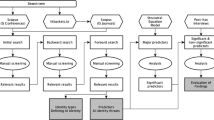Abstract
Artificial intelligence (AI) plays an important role in current discussions on information and communication technologies (ICT) and new modes of algorithmic governance. It is an unavoidable dimension of what social mediations and modes of reproduction of our information societies will be in the future. While several works in artificial intelligence ethics (AIE) address ethical issues specific to certain areas of expertise, these ethical reflections often remain confined to narrow areas of application, without considering the global ethical issues in which they are embedded. We, therefore, propose to clarify the main approaches to AIE, their philosophical assumptions and the specific characteristics of each one of them, to identify the most promising approach to develop an ethical reflection on the deployment of AI in our societies, which is the one based on information ethics as proposed by Luciano Floridi. We will identify the most important features of that approach to highlight areas that need further investigation.

Similar content being viewed by others
References
Alter A (2018) Irresistible, the rise of addictive technology and the business of keeping us hooked. Penguin Books, New York
Ananny M, Crawford K (2016) Seeing without knowing: limitations of the transparency ideal and its application to algorithmic accountability. New Media Soc 20(3):973–989
Anderson M, Anderson SL (eds) (2011) Machine ethics. Cambridge University Press, Cambridge
Andrejevic M (2013) Infoglut, how too much information is changing the way we think and know. Routledge, New York
Awad E (2018) The moral machine experiment. Nature 563:59–77
Bengio Y, Luccioni S (2019) On the morality of artificial intelligence. arXiv:1912.11945 [cs.CY], December 2019.
Boddington P (2017) Towards a code of ethics for artificial intelligence. Springer, New York
Bostrom N (2014) Superintelligence, paths, dangers, strategies. Oxford University Press, Oxford
Boutin E (2006) Biais cognitifs et recherche d'information sur internet. Quelles perspectives pour les indicateurs de pertinence des moteurs de recherche. VSST 2006. https://archivesic.ccsd.cnrs.fr/sic_00827309/document. Accessed 18 Jan 2019
Brey P (2010) Values in technology and disclosive computer Ethics. In: Floridi L (ed) The cambridge handbook of information and computer ethics. Cambridge University Press, Cambridge, pp 41–58
Broussard M (2018) Artificial unintelligence, how computers misunderstand the world. MIT Press, Cambridge
Bruneault F (2012) Comment définir une éthique pour notre civilisation technologique? L’apport d’une lecture conjointe des pensées de Karl-Otto Apel et Hans Jonas. Laval Théologique et Philosophique 68(2):335–357
Bryson JJ (2019) The past decade and future of AI’s impact on society. In: Towards a new enlightenment? BBVA. bbvaopenmind.com/wpcontent/uploads/2019/02/BBVA-OpenMind-book-2019-Towards-a-New-Enlightenment-A-Trascendent-Decade-3.pdf. Accessed 20 Feb 2020
Bucher T (2018) If… then, algorithmic power and politics. Oxford University Press, Oxford
Cheney-Lippold J (2017) We are data, algorithms and the making of our digital selves. New York University Press, New York
Cohen JE (2012) Configuring the networked self, law, code, and the play of everyday practice. Yale University Press, New Haven, London
Costa L (2016) Virtuality and capabilities in a world of ambient intelligence, new challenges to privacy and data protection. Springer, New York
De Filippi P (2016) Gouvernance algorithmique: vie privée et autonomie individuelle à l’ère des Big Data. In: Primavera De Filippi & Danièle Bourcier (dir.). Open Data & Data Protection : Nouveaux défis pour la vie privée. Mare and Martin.
De Grosbois P (2018) Les Batailles d’Internet, Assauts et résistances à l’ère du capitalisme numérique. Écosociété, Montréal
Dean J (2009) Democracy and other neoliberal fantasies, communicative capitalism and left politics. Duke University Press, Durham
Dignum V (2019) Responsible artificial intelligence. How to develop and use ai in a responsible way. Springer, Berlin
Domingos P (2015) The master algorithm, how the quest for the ultimate learning machine will remake our world. Basic Books, New York
Feenberg A (1991) Critical theory of technology. Oxford University Press, Oxford
Feenberg A (2010) Between reason and experience. essays in technology and modernity. MIT Press, Cambridge
Floridi L (1999) Philosophy and computing, an introduction. Routledge, London
Floridi L (2011) The philosophy of information. Oxford University Press, Oxford
Floridi L (2013) The Ethics of Information. Oxford University Press, Oxford
Floridi L (2014) The 4th revolution, how the infosphere is reshaping human reality. Oxford University Press, Oxford
Floridi L (ed) (2015) The onlife manifesto, being human in a hyperconnected era. Springer, New York
Freitag M (2003) La dissolution systémique du monde réel dans l’univers virtuel des nouvelles technologies de la communication informatique : une critique ontologique et anthropologique. Dans Mattelart, A. et Tremblay, G. (dir.) 2001 Bogues: communication, démocratie et globalisation. tome 4, Québec : Presses de l’Université Laval, pp 279–296.
Freitag M (2018) La société informatique et le respect des formes. Le Naufrage de l’université et autres essais d’épistémologie politique. Alias, Montréal
George É, Kane O (2015) Les technologies numériques au prisme des approches critiques: éléments pour l’ébauche d’une rencontre. Can J Commun 40:727–735
Gibert M (2020) Faire la morale aux robots: une introduction à l’éthique des algorithmes. Atelier 10, Montréal
Hansen MBN (2006) Bodies in code, interfaces with digital media. Routledge, New York
Hunyadi M (2018) Le temps du posthumanisme, un diagnostic d’époque. Les Belles Lettres, Paris
Jobin A, Ienca M, Vayena E (2019) The global landscape of ai ethics guidelines. Nature Mach Intell 1:389–399
Johnson DG, Verdicchio M (2017a) Reframing ai discourse. Mind Mach 27(4):575–590
Johnson DG, Verdicchio M (2017b) AI Anxiety. J Assoc Inform Sci Technol 68(9):2267–2270
Jonas H (1979) Das prinzip verantwortung. Versuch einer Ethik für die technologische Zivilisation. Suhrkamp Verlag, Frankfurt am Main
Kurzweil R (2007) Humanité 2.0. La bible du changement. M21 Éditions, Paris
Levesque HJ (2017) Common sense, the turing test, and the quest for real aI. MIT Press, Cambridge
Maclure J (2019) The new ai spring: a deflationary view. AI Soc J Knowl Cult Commun. https://doi.org/10.1007/s00146-019-00912-z
Maclure J, Saint-Pierre M-N (2018) Le nouvel âge de l’intelligence artificielle: une synthèse des enjeux éthiques. Les Cahiers de Propriété Intellectuelle 30(3):741–765
Mayer-Schönberger V (2014) La révolution big data. Politique Étrangère 4:69–81
Mittelstadt B (2019) Principles alone cannot guarantee ethical Ai. Nature: 501–507.
Mondoux A (2011) Identité numérique et surveillance. Les Cahiers du numérique 7(1):49–59
Mondoux A, Ménard M (2018) Big data et société, industrialisation des médiations symboliques. Presses de l’Université du Québec, Québec
More M (1990) Transhumanism: towards a futurist philosophy. Extropy 6. http://fennetic.net/irc/extropy/ext6.pdf. Accessed 10 May 2020
Morozov E (2013) To save everything, click here. PublicAffairs Books, Philadelphia
Nissenbaum H (2010) Privacy in context: technology, policyand the integrity of social life. Stanford University Press, Stanford
Oosterlaken I, van den Hoven J (eds) (2012) The capability approach, technology and design. Springer, New York
Ouellet M (2015) Big data et quantification de soi : la gouvernementalité algorithmique dans le monde numériquement administré. Can J Commun 40:597–613
Ouellet M (2016) La révolution culturelle du capital, le capitalisme cybernétique dans la société globale de l’information. Écosociété, Montréal
Pasquale F (2015) The black box society: the secret algorithms that control money and information. Harvard University Press, Cambridge
Rouvroy A, Berns T (2013) Gouvernementalité algorithmique et perspectives d’émancipation. Réseaux. https://doi.org/10.3917/res.177.0163
Rouvroy A, Stiegler B (2015) Le régime de vérité numérique. Socio. 4. https://journals.openedition.org/socio/1251; https://doi.org/10.4000/socio.1251. Accessed 18 Aug 2019
Russell S (2019) Human compatible: artificial intelligence and the problem of control. Viking, New York
Stahl BC (2007) Ontology, life-world, and responsibility in IS. In: Sharman R, Kishore R, Ramesh R (eds) Ontologies: a handbook of principles, concepts and applications in information systems. Springer, Berlin
Susskind J (2018) Future politics, living together in a world transformed by tech. Oxford University Press, Oxford
Taylor A (2014) Démocratie.com, pouvoir, culture et résistance à l’ère des géants de la Silicon Valley. Lux, Montréal
Tegmark M (2017) Life 3.0, being human in the age of artificial intelligence. Vintage Books, New York
Turkle S (2005) The second self: computers and the human spirit. MIT Press, Cambridge
van den Hoven J (2010) The use of normative theories in computer ethics. The Cambridge handbook of information and computer ethics. Cambridge University Press, Cambridge
Whittaker M (2019) Artificial intelligence: societal and ethical implications. In: United States house of representatives committee on science, space, and technology. June 26. https://science.house.gov/imo/media/doc/Whittaker%2520Testimony.pdf. Accessed 1 Dec 2019
Wiener N (1954) The human use of human beings, cybernetics and society. Doubleday, New York
Zheng Y, Stahl BC (2011) Technology, capabilities and critical perspectives: what can critical theory contribute to sen’s capability approach? Ethics Inf Technol 13(2):69–80
Author information
Authors and Affiliations
Corresponding author
Additional information
Publisher's Note
Springer Nature remains neutral with regard to jurisdictional claims in published maps and institutional affiliations.
Rights and permissions
About this article
Cite this article
Bruneault, F., Laflamme, A.S. AI Ethics: how can information ethics provide a framework to avoid usual conceptual pitfalls? An Overview. AI & Soc 36, 757–766 (2021). https://doi.org/10.1007/s00146-020-01077-w
Received:
Accepted:
Published:
Issue Date:
DOI: https://doi.org/10.1007/s00146-020-01077-w




